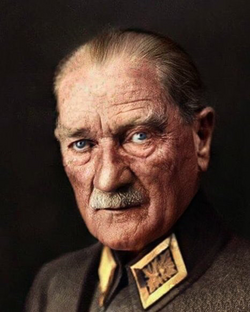User:Tranvea/Sanbox 3: Difference between revisions
No edit summary |
|||
| Line 37: | Line 37: | ||
|predecessor5 = ''Post established'' | |predecessor5 = ''Post established'' | ||
|successor5 = ''Post abolished'' | |successor5 = ''Post abolished'' | ||
|birth_date = {{Birth date| | |birth_date = {{Birth date|1880|11|07}} | ||
|birth_place = {{flagicon|Etruria}} [[Shahrdar]], [[Shahdom of Pardaran]] | |birth_place = {{flagicon|Etruria}} [[Shahrdar]], [[Shahdom of Pardaran]] | ||
|death_date = {{Death date and age| | |death_date = {{Death date and age|1956|01|02|1880|11|07}} | ||
|death_place = [[File:Flag of the NRP.png|22x20px]] [[Zahedan]], [[Union of Khazestan and Pardaran]] | |death_place = [[File:Flag of the NRP.png|22x20px]] [[Zahedan]], [[Union of Khazestan and Pardaran]] | ||
|restingplace = [[Haram-ye Heybat]], [[Shahrdar]] | |restingplace = [[Haram-ye Heybat]], [[Shahrdar]] | ||
| Line 70: | Line 70: | ||
| battles = [[Khordad Rebellion]]<br/>[[Great War (Kylaris)|Great War]]<br/>[[Operation Praetor]]<br/>[[Solarian War]]<br/>[[Pardarian Civil War]] | | battles = [[Khordad Rebellion]]<br/>[[Great War (Kylaris)|Great War]]<br/>[[Operation Praetor]]<br/>[[Solarian War]]<br/>[[Pardarian Civil War]] | ||
}} | }} | ||
'''Mahrdad Ali Sattari''' ({{wp|Farsi|Pasdani}}: مهرداد علی ستاری; born 7 November 1880, died 2 January 1956) was a [[Zorasan|Zorasani]] {{wp|politician}}, {{wp|statesman}}, {{wp|military officer}}, {{wp|revolution}}ary and a [[Union Fathers|founding father]] of the [[Union of Khazestan and Pardaran]]; serving as its first supreme leader from 1953 until his death in 1956. During his supreme leadership, he sought to consolidate the Pan-Zorasanist union, establishing the basis for the emergence of a {{wp|totalitarian}} {{wp|single party state|single party military dictatorship}} and set it on course to achieve [[Zorasani Unification]] in 1980. Sattari was ideologically defined by his {{wp|republicanism}}, {{wp|nationalism}}, [[Pan-Zorasanism]] and unique form of {{wp|secularism}}, in what became known as [[Sattarism]]. Due to his role in resisting Euclean colonialism and his later achievment in forming the UKP, Sattari is regarded as one of the most important figures of the 20th century. | |||
== Early life == | == Early life == | ||
Latest revision as of 12:06, 30 December 2020
Mahrdad Ali Sattari | |
|---|---|
| مهرداد علی ستاری | |
 | |
| 1st Supreme Leader of the Union | |
| In office 5 February 1953 – 3 January 1956 | |
| Deputy | Hossein Khalatbari |
| Preceded by | Office established |
| Succeeded by | Hossein Khalatbari (interim) |
| Chairman of the Revolutionary Command Council | |
| In office 5 February 1953 – 3 January 1956 | |
| Deputy | Hossein Khalatbari |
| Preceded by | Office established |
| Succeeded by | Hossein Khalatbari (interim) |
| Chairman of the Revolutionary Masses Party | |
| In office 23 June 1946 – 3 January 1956 | |
| Preceded by | Office established |
| Succeeded by | Hossein Khalatbari (interim) |
| Supreme Leader of the Republic of Pardaran | |
| In office 5 August 1950 – 5 February 1953 | |
| Preceded by | Post established |
| Succeeded by | Post abolished |
| Supreme Commander of the Revolutionary Resistance | |
| In office 3rd May 1924 – 5th August 1950 | |
| Preceded by | Post established |
| Succeeded by | Post abolished |
| Personal details | |
| Born | November 7, 1880 |
| Died | January 2, 1956 (aged 75) |
| Resting place | Haram-ye Heybat, Shahrdar |
| Political party | Revolutionary Masses Party (1946-1954) |
| Other political affiliations | Tabarzin (1914-1922) |
| Spouse | Khajasteh Soleimani (m. 1915 d. 1950) |
| Alma mater | Imperial Academy of War |
| Military service | |
| Allegiance | |
| Branch/service | |
| Rank | General |
| Battles/wars | Khordad Rebellion Great War Operation Praetor Solarian War Pardarian Civil War |
Mahrdad Ali Sattari (Pasdani: مهرداد علی ستاری; born 7 November 1880, died 2 January 1956) was a Zorasani politician, statesman, military officer, revolutionary and a founding father of the Union of Khazestan and Pardaran; serving as its first supreme leader from 1953 until his death in 1956. During his supreme leadership, he sought to consolidate the Pan-Zorasanist union, establishing the basis for the emergence of a totalitarian single party military dictatorship and set it on course to achieve Zorasani Unification in 1980. Sattari was ideologically defined by his republicanism, nationalism, Pan-Zorasanism and unique form of secularism, in what became known as Sattarism. Due to his role in resisting Euclean colonialism and his later achievment in forming the UKP, Sattari is regarded as one of the most important figures of the 20th century.